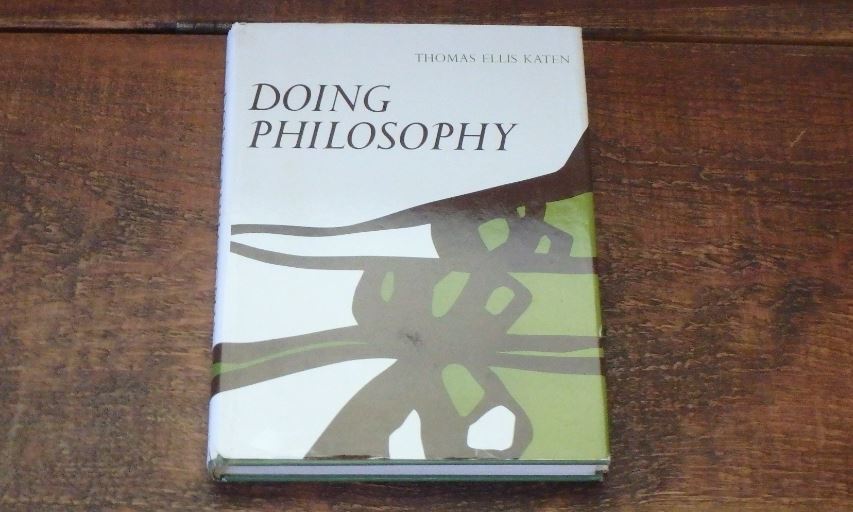
A Christian Conservative Goes to College, part 2 (Philosophy 101)
“If only you would keep completely silent! For you that would be wisdom” (Job 13:5).
“Philosophy” is a word based upon two Greek root words, “philo” meaning “love” and “sophia” meaning “wisdom.” Thus Philosophy is supposed to mean, “love of wisdom.” “Wisdom is supreme,” the Scriptures tell us, “so acquire wisdom, and whatever you acquire, acquire understanding” (Proverbs 4:7).
I took my first Philosophy class in my very first semester of college. I was very excited about taking it because I wanted to learn more about Socrates, Plato, and Aristotle. I wanted to learn about the great thinkers. I was ready for God to teach me His Truth even through the secular. What I wasn’t ready for, however, was the antagonistic approach many Philosophy professors take. This, it turned out, would include my very first Philosophy professor. Thankfully, he was not the “worst” or most antagonistic Philosophy professor I had during my college years. And, at first glance, he seemed harmless enough: He was an older fellow with semi-long, disheveled hair, who looked a bit like Doc Brown from the Back to the Future movies. But from the very first class, he attacked my Christian faith and beliefs… or I could say, from the moment that first college class bell went off, the attack on my faith and beliefs had begun.
“If only you would keep completely silent! For you that would be wisdom” (Job 13:5).
“Philosophy” is a word based upon two Greek root words, “philo” meaning “love” and “sophia” meaning “wisdom.” Thus Philosophy is supposed to mean, “love of wisdom.” “Wisdom is supreme,” the Scriptures tell us, “so acquire wisdom, and whatever you acquire, acquire understanding” (Proverbs 4:7).
I took my first Philosophy class in my very first semester of college. I was very excited about taking it because I wanted to learn more about Socrates, Plato, and Aristotle. I wanted to learn about the great thinkers. I was ready for God to teach me His Truth even through the secular. What I wasn’t ready for, however, was the antagonistic approach many Philosophy professors take. This, it turned out, would include my very first Philosophy professor. Thankfully, he was not the “worst” or most antagonistic Philosophy professor I had during my college years. And, at first glance, he seemed harmless enough: He was an older fellow with semi-long, disheveled hair, who looked a bit like Doc Brown from the Back to the Future movies. But from the very first class, he attacked my Christian faith and beliefs… or I could say, from the moment that first college class bell went off, the attack on my faith and beliefs had begun.
Now to be fair, I’ll confess that the professor appeared to attack just about everything right out of the box. He challenged “Darwinianism” and said that many Atheist scientists believe in and practice a religion called “Scientism,” and that while they battle to keep God and religion out of the classroom, they insist that their Scientism-religion be taught. The professor said that in many areas Darwin had been proven wrong, that evolution’s fossil record was “nil,” and that while micro-evolution had been proven, macro-evolution could never be proven. He went as far as to say that Intelligent Design, when put forth by scientists, had a lot of credence. He challenged the label “Pro-Choice” people have given themselves, saying, “After all, what they really are is Pro-Abortion. They certainly are not ‘Pro-Choice’ on everything.”
Most of his attacks, though, were aimed at Republicans, Conservatives, or Christians. (Note: I am not making these terms/titles synonymous.) For instance, he said those in the Pro-Life camp contradicted themselves when they also supported things like war or the death penalty for murderers. In fact he said, “Christians don’t care what happens to you after you’re born, just as long as you’re parents have you.” He also said, “Why is it always the Born Agains who rail against sex, but they have their own harem on the side? Have you noticed that?” No matter what topic he talked about, he would usually circle back around to Christians again.
As he spoke and questioned everything he would say, “I’m here to challenge your beliefs, to get you to think outside of the box.” Whenever he had made a mini-speech about what was wrong with Christianity or again questioned Christians for a bit too long, he would then say something like, “I’m not trying to pick on Christians; I’m just trying to get you thinking.” For some reason that reminds me of the Proverb which says, “Like a madman who shoots firebrands and deadly arrows… is a person who deceives his neighbor, and says, ‘Was I not only joking?’” (Proverbs 26:18-19).
Knowing a little bit (just a little bit) more about Philosophy and argumentation now, I can suggest that the professor was engaging in a fallacious[1] form of questioning or argumentation. I would later learn that questions like the ones he was asking can be considered “loaded questions.” A more specific name for it is “complex question,” of which Wikipedia says, “One form of misleading discourse is where something is presupposed and implied without being said explicitly, by phrasing it as a question.” Wasn’t that what the teacher was doing? Wasn’t he really making statements through the questions he was posing? Wasn’t he really stating his beliefs? Yet all the while he was allowing himself an “out” by saying something like, “I’m only asking questions, not making statements.” Wikipedia also mentions that such questions can have “emotive[2] implication[s]…” Certainly his questions could easily give rise to the emotions of a person who held the beliefs he was questioning, but also could give rise to emotions of any person who disliked the beliefs he was questioning.
But the professor said he wasn’t doing that… He was just trying to get us to think. It is certainly possible he was just trying to shake us up, to get us self-evaluating, questioning, and examining. After all, the famous line, attributed to Socrates, is that “the unexamined life is not worth living.” (And that philosopher, the Apostle Paul said, “The man who thinks he knows something does not yet know as he ought to know” 1 Corinthians 8:2, NIV). So I will give the professor the benefit of the doubt that his constant bombardment of Christians and Christianity was because he believed he had a class full of Christians (though we certainly appear to live in a post-Christian nation) and he wanted to make them examine their own belief system; though I do think many of his questions were reflecting his own belief system as well.
At one point he asked how many Christians there were in the class. In response to the question, a lot of the students raised their hands, including me. (I would later find out that many, if not most, of the students simply appeared to be “cultural Christians” as opposed to true orthodox believers.)[3] And thus the barrage continued while most of the people who had raised their hands sat there docile. Unfortunately this included me a lot of the time. After all, this was one of my first classes. How should or could I react? Well, physically I was reacting already as adrenaline pumped and I was hot with what I certainly interpreted as anger. And how was I to respond since I was a student in a classroom, since I was unsteady on my apologetic feet, and since I was hot with anger (see Ephesians 4:26, Proverbs 29:11, James 1:20). All I could manage at that moment was to pray and talk to God and ask for… wisdom (James 1:5).
But the professor continued provoking. He returned again and again to the idea that Christians contradicted themselves by being against abortion, but in support of the death penalty or in support of the war: “Christians,” he said, “would be the first ones to pick up a sword and kill you.” That was the straw that woke many in the class up (including me). We objected. “You don’t think so?” he asked.
No.
So the professor changed the subject and moved on.
It was then that I first observed (the first of many, many similar observations over the next few years) that the professor wasn’t looking to debate or discuss the things he was saying (“teaching?”). He simply appeared to be enjoying hearing himself speak, enjoying the platform that his position afforded him. He was center stage. He had a captive audience for three hours. He was master of ceremonies and the headlining act, and we students had all paid to have him perform for us. But it seemed he wasn’t much interested in sharing the spotlight or giving the audience a speaking part.
This brings me back to the idea of the complex question fallacy. In my Introduction to Logic textbook (purchased many semesters later), a complex question is defined as “An informal fallacy in which a question is asked in such a way as to presuppose the truth of some conclusion buried in that question. The question itself is likely to be rhetorical, no answer being genuinely sought.”[4]
Even after class, when I attempted to engage him on some of the Christian topics, it really seemed to me that the professor was not interested in hearing what I might have to say; he didn’t always seem to be listening, but seemed only to be waiting for me to stop talking so he could make his next point. I would guess that a lot of professors are like that. After all, anyone who has been teaching for a decade or more has probably heard the same objections over and over again. They are ready for certain responses and arguments. They’ve had years to work on their positions, while the students who encounter them may be facing the arguments or questions for the first time.
In my next “A Christian Conservative Goes to College” column I will share how during a discussion after one of my early Philosophy classes, the professor directly told me, several times, “Well, then, you are not a Christian.” (Remember that I said he was not the “worst” or most antagonistic Philosophy professor I had during my college years.)
My introduction to college was underway.
I’d returned to school to learn and grow and find God’s truth… and God was going to accomplish these things in my life, just not in the way I’d expected. I thought I was going to be learning a lot from my professors and teachers (and to be fair, I did), but oftentimes I learned just as much through my own personal study and research, done in response to the “antagonism” of Christianity taught at school. The Lord God was going to teach me in His own way.
A prayer written in my journal, after describing that first class, reads something like this: “Lord, I pray that you strengthen me though all this. Grant me wisdom and knowledge, and the ability to formulate clear ideas that support your truth. Help me see things out of the box. Reveal to me where I have simply followed what others have said without thinking through them or studying them for myself. Let me be ever in search of your truth. Strengthen me through all this. In Jesus’ name. Amen.”
Pray for the Christian students in secular colleges and universities.
“Indeed, you are my lamp, Lord. The Lord illumines the darkness around me” (2 Samuel 22:29).
_____________________________________________________________
Check out my other columns here.
Other columns in this series:
A Christian Conservative Goes to College, part 2 (Philosophy 101)
A Christian Conservative Goes to College, part 3 (“Then you are not a Christian.”)
A Christian Conservative Goes to College, part 4 (“The man does not even believe in evolution.”)
A Christian Conservative Goes to College, part 5 (A Pretty Girl Becomes Less Attractive)
A Christian Conservative Goes to College, part 6 (Philosophy 111: Critical Thinking)
A Christian Conservative Goes to College, part 7 (Critical Thinking and the Abortion Debate)
A Christian Conservative Goes to College, part 8 (Critical Thinking and the Abortion Debate continued)
A Christian Conservative Goes to College, part 9 (The Problem of Evil – in a Nutshell?)
A Christian Conservative Goes to College, part 10 (World Religions: From the Frying Pan into the Fire)
A Christian Conservative Goes to College, part 11 (World Religions: The Blind Leading the Blind)
A Christian Conservative Goes to College, part 12 (“How to Stay Christian in College” (Book Review)
A Christian Conservative Goes to College, part 13 (World Religions Class: Attack on the Bible)
A Christian Conservative Goes to College, part 14 (World Religions Class: Documentary Hypothesis)
A Christian Conservative Goes to College, part 15 (World Religions Class: Obfuscating the Old Testament)
A Christian Conservative Goes to College, part 16 (World Religions Class: Silent No More)
A Christian Conservative Goes to College, part 17 (What Can We Make of Jesus, but God Incarnate?)
A Conservative Christian Goes to College, part 18 (“The Confessions of St. Augustine”)
A Conservative Christian Goes to College, part 19 (Unitarian Universalism: Recipe for Disaster)
A Conservative Christian Goes to College, part 20 (Unitarian Universalism: “It Means Whatever You Want it to Mean.”)
Bonus: God’s Not Dead (The Movie)
______________________________________________________________________
[1] Unsound, misleading, or deceptive.
[2] From dictionary.com: “characterized by or pertaining to emotion” and “directed toward the emotions”.
[3] Please don’t take this comment the wrong way; I cannot and dare not to judge who was or was not a true believer. I am simply making an observation of how they responded to many questions and things they said in many discussions throughout the semester. Many of their answers seemed to lack any biblical or orthodox Christian understanding; sadly, much of it seemed to be a potpourri mixture of relativistic subjective beliefs.
[4] Introduction to Logic, Twelfth Edition, by Copi and Cohen, copyright 2005, published by Prentice Hall, Saddle River, NJ, chapter 5, section 5.5, P2, bold and italic emphasis added



One Comment
Bob Miller
Attack & Retreat Tactics
I also found the same tactics being used by my “Professors”: Those professing to be wise because they hold the papers declaring they paid attention and agreed with those professors that went before them. Guerrilla Warfare: Stating a “group think” fact, then stating another said fact, diverting from questioning the first statement (doing this continually). The ideas being taught in college today are not free thinking or debating the status quo, rather conformity to current social thought (group think). It’s funny how they teach against Group Thinking (past group thinking), while encouraging present students to think as the new group does their thinking for them.